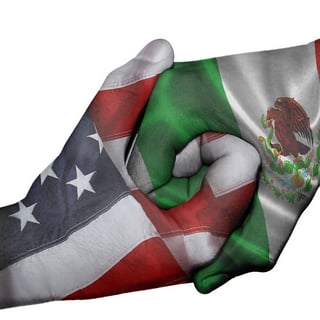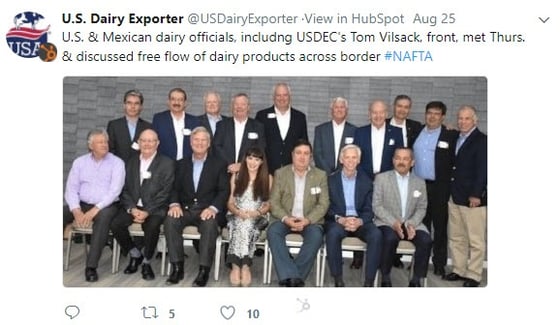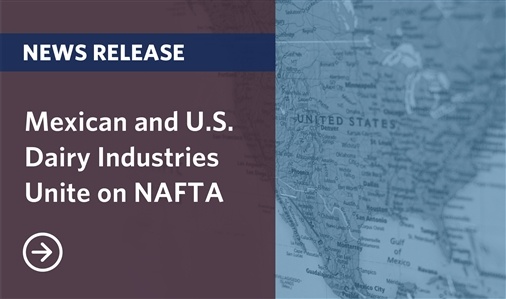-
9 Shared Priorities of U.S. and Mexico Dairy
By USDEC September 1, 2017- Tweet
NAFTA modernization talks resume today with dairy leaders from the United States and Mexico in agreement on key issues, including Canada's unfair pricing policy.

As the second round of NAFTA modernization talks begin today, the U.S. and Mexican dairy industries are united on a set of nine common priorities. They include a renegotiated NAFTA that puts an end to Canada's Class 7 milk pricing scheme.
Dairy leaders from the United States and Mexico issued a joint statement on their priorities after a second annual summit of the August 24 United States-Mexico Dairy Alliance, in Guadalajara, Mexico.
The two dairy industries want government officials gathered in Mexico City today through Tuesday to consider their common concerns as they attempt to hammer out terms of a new North American Free Trade Agreement (NAFTA).
U.S. Dairy Export Council CEO and President Tom Vilsack attended the meeting in Guadalajara last week and was encouraged by a spirit of growing collaboration and partnership with Mexico's dairy industry.
"We want to strengthen our relationship as Mexico’s most trusted dairy trading partner so we can continue to work together for the benefit of dairy sectors on both sides of the border,” said Vilsack. “That goal is all the more essential given other nations’ efforts to pursue harmful and disruptive approaches to dairy trade with Mexico through practices that hurt Mexican and U.S. dairy farmers and workers in the process.”
In February, Canada implemented a special milk Class 7 pricing policy that artificially lowers milk ingredient prices for Canadian processors and is designed to push excess Canadian proteins out onto world markets at below-market prices, while at the same time incentivizing the substitution of domestic Canadian dairy ingredients for imported ingredients.
The result of this policy was the widely reported cancellation of purchases by Canadian cheese makers of U.S.-sourced ultra-filtered (UF) milk in the first quarter of this year, and the even more damaging ability of Canadian exporters to sell milk proteins globally at a much lower price, thereby undercutting exports from the U.S. and the other countries. It is due to this latter impact that dairy groups in multiple countries have been expressing opposition to Canada’s new system.
In an interview with RFD-TV, a cable channel owned by Rural Media Group, Vilsack provided more details about last week's U.S.-Mexico dairy summit and the harmful effects of Canada's Class 7 pricing policy (see video below).
Groups represented at the U.S.-Mexico dairy summit included USDEC and the National Milk Producers Federation (NMPF), along with the Confederación Nacional de Organizaciones Ganaderas, Gremio de Productores Lechero de la República Mexicana, and the Asociación Nacional de Ganaderos Lecheros, along with Mexican processor organization Camara Nacional de Industriales de la Leche.

At a day-long session, they crafted a written list of priorities. At the top of the list was supporting efforts to modernize the North American Free Trade Agreement (NAFTA) in a way that solidifies their strong dairy market partnership.Dairy leaders from both countries agreed to work collaboratively on these nine priorities:
1. NAFTA: Support efforts to modernize NAFTA in recognition of the benefits it has generated for both countries, and seek avenues to improve commercial trade that currently exists among the three countries by ensuring the free flow of dairy products and eliminating any possible trade barriers.
2. Market Access: Commit to working jointly to preserve existing market access opportunities between Mexico and the United States, and improve them where possible to benefit both milk sectors.
3. Canada: Strongly urge our respective governments to seek the full inclusion of Canada’s dairy trade provisions within the North American Free Trade Agreement, and express to our respective governments our concerns regarding Canada’s new milk pricing scheme which could significantly harm milk producers and processors in both Mexico and the United States of America.
4. GIs: Agree to continue working to defend generic “common” food names, especially with regard to bilateral trade agreements of both countries with the European Union. In conjunction with the pertinent authorities, we will work together to defend common food names in legal texts regarding “geographic Indications” in order to safeguard at all times the free production and marketing of products that are listed under said category.
5. Grade A milk standard: Establish a working group to analyze the implementation of the U.S. Grade A milk standard with the goal of developing a course of action to ensure that existing regulations are applied uniformly to the industries of both nations. It was also agreed to draft a joint letter directed to the regulatory agencies regarding this subject. The U.S. group offered to collaborate in technical assistance to increase knowledge and understanding of the Grade A process.
6. Raw milk: To facilitate trade of raw milk for processing purposes between both countries, a working group will be established to analyze and recommend measures to the respective governments to resolve this issue on the basis of sanitary and scientific standards.
7. Information exchange: Continue to exchange information on developments in the milk sector in both countries, as well as on international milk and milk product markets.
8. Technology and training: Work to strengthen cooperation in terms of technological exchange and training in aspects covering farm milk production as well as on milk quality and nutritional information.
9. Increasing demand: Work jointly to promote increased milk and milk products consumption in Mexico, optimizing the positive experience of the U.S. dairy industry. Such efforts will include social network management and information exchange on research regarding dairy’s contributions to improving health, seeking to strengthen and diversify promotional actions, particularly those addressing the nutrition and health sector.Jim Mulhern, president and CEO of NMPF, considered the meeting an unqualified success and a continuation of a mutually beneficial trade partnership.
"We are very pleased that our friends in Mexico have joined us in expressing opposition to the abusive attempts of the European Union to confiscate common food names, as well as the trade distorting practices of Canada, at a time when we are working to facilitate new opportunities throughout North America," said Mulhern.
For a fuller account of the meeting of the United States-Mexico Dairy Alliance, click on the image below to read an USDEC news release.
Mark O'Keefe is vice president of editorial services at the U.S. Dairy Export Council.
Learn more:
- Dairy Exports to Mexico Create Nearly 25,000 Jobs and Countless Friendships
- U.S. and Mexican Dairy Industries Make United Call for NAFTA to Protect and Enhance Free Dairy Trade, While Rejecting Canadian and EU Trade-Distorting Practices
- Vilsack Tells Congress: `We Can't Afford to Lose This Race With EU' Over Cheese Names
- For World Milk Day: Economic Facts About U.S. Dairy Exports to Mexico
Subscribe to the U.S. Dairy Exporter Blog
The U.S. Dairy Export Council fosters collaborative industry partnerships with processors, trading companies and others to enhance global demand for U.S. dairy products and ingredients. USDEC is primarily supported by Dairy Management Inc. through the dairy farmer checkoff. How to republish this post.
10 Most Recent Posts
Most Popular Posts in Past Year
Index of Posts by Topic
- #GotDairyJobs (4)
- About USDEC (67)
- Africa (6)
- Australia (4)
- Blog (8)
- Brazil (4)
- Canada (20)
- Central America (1)
- Cheese (58)
- Chile (1)
- China (54)
- Common food names (7)
- Company News (20)
- Consistent Supply (1)
- Crisis Management (3)
- Cuba (2)
- Dairy (6)
- Dairy checkoff (9)
- Dairy Ingredients (5)
- Dairy Management Inc. (2)
- Dairy Resources (1)
- Dairy Supply Chain (1)
- Dairy Trends (5)
- Documentation (3)
- EU (24)
- Experts on Dairy Exports (4)
- Exporter of the Year (2)
- Exports (24)
- Farmer leaders (1)
- Farming (38)
- Food Aid (8)
- Food Safety (8)
- Foodservice (3)
- Free trade agreements (34)
- Future trends (1)
- Geographical Indications (GIs) (10)
- Global Marketing (86)
- Global Shipping Crisis (1)
- Got Jobs? (9)
- Indonesia (1)
- Innovation (17)
- Japan (17)
- Krysta Harden (1)
- Market Access (25)
- Market Conditions (271)
- Member Services (17)
- Mexico (41)
- Middle East (9)
- Middle East & North Africa (3)
- Middle East/North Africa (9)
- Milk (4)
- Milk Protein Concentrate (MPC) (2)
- New Zealand (11)
- Next5% (20)
- Nonfat Dry Milk/Skim Milk Powder (8)
- Nutrition (19)
- Product Innovation (6)
- Protein (4)
- Regulations (5)
- Research & Data (329)
- Russia (3)
- Singapore (10)
- South America (8)
- South Korea (10)
- Southeast Asia (25)
- Strategic Insights (1)
- Supply (1)
- Sustainability (26)
- Technology (2)
- ThinkUSADairy (5)
- TPM23 (1)
- TPP (13)
- Traceability (8)
- Trade Barriers (5)
- Trade Data (7)
- Trade Policy (72)
- TTIP (5)
- UHT Milk (7)
- USMCA (2)
- Vietnam (4)
- Whey (6)
- Whey Ingredients (2)
- Whey products (10)
- Whole Milk Powder (WMP) (3)
- World Dairy Expo (1)
- World Milk Day (1)
- Yogurt (1)
Index of Posts by Date, Author
- June 2021 (13)
- March 2015 (12)
- September 2015 (12)
- April 2015 (11)
- December 2015 (11)
- March 2014 (10)
- February 2015 (10)
- October 2015 (10)
- October 2014 (9)
- June 2015 (9)
- July 2015 (9)
- November 2015 (9)
- March 2016 (9)
- October 2019 (9)
- September 2013 (8)
- May 2015 (8)
- August 2015 (8)
- January 2016 (8)
- February 2016 (8)
- March 2017 (8)
- December 2018 (8)
- May 2019 (8)
- December 2019 (8)
- June 2014 (7)
- November 2016 (7)
- May 2017 (7)
- May 2018 (7)
- July 2020 (7)
- June 2023 (7)
- July 2016 (6)
- August 2018 (6)
- October 2018 (6)
- November 2018 (6)
- February 2019 (6)
- June 2019 (6)
- August 2019 (6)
- March 2020 (6)
- April 2020 (6)
- June 2020 (6)
- June 2022 (6)
- February 2014 (5)
- June 2016 (5)
- August 2016 (5)
- September 2016 (5)
- December 2016 (5)
- February 2017 (5)
- July 2017 (5)
- October 2017 (5)
- January 2018 (5)
- April 2018 (5)
- June 2018 (5)
- July 2018 (5)
- September 2018 (5)
- January 2019 (5)
- March 2019 (5)
- April 2019 (5)
- July 2019 (5)
- September 2019 (5)
- November 2019 (5)
- January 2020 (5)
- August 2020 (5)
- October 2020 (5)
- April 2021 (5)
- January 2022 (5)
- May 2013 (4)
- September 2014 (4)
- April 2016 (4)
- May 2016 (4)
- October 2016 (4)
- January 2017 (4)
- April 2017 (4)
- June 2017 (4)
- August 2017 (4)
- September 2017 (4)
- December 2017 (4)
- February 2018 (4)
- February 2020 (4)
- May 2020 (4)
- February 2022 (4)
- September 2022 (4)
- April 2023 (4)
- December 2023 (4)
- November 2017 (3)
- March 2018 (3)
- September 2020 (3)
- December 2020 (3)
- February 2021 (3)
- May 2021 (3)
- August 2021 (3)
- December 2021 (3)
- March 2022 (3)
- April 2022 (3)
- May 2022 (3)
- October 2022 (3)
- December 2022 (3)
- May 2023 (3)
- July 2023 (3)
- November 2023 (3)
- January 2026 (3)
- March 2011 (2)
- June 2011 (2)
- September 2011 (2)
- March 2012 (2)
- June 2012 (2)
- July 2012 (2)
- March 2013 (2)
- July 2013 (2)
- November 2020 (2)
- January 2021 (2)
- March 2021 (2)
- July 2021 (2)
- September 2021 (2)
- October 2021 (2)
- November 2021 (2)
- July 2022 (2)
- August 2022 (2)
- January 2023 (2)
- March 2023 (2)
- October 2023 (2)
- January 2024 (2)
- February 2024 (2)
- April 2024 (2)
- June 2024 (2)
- July 2024 (2)
- November 2024 (2)
- December 2024 (2)
- February 2025 (2)
- June 2025 (2)
- July 2025 (2)
- September 2025 (2)
- November 2025 (2)
- December 2025 (2)
- January 2010 (1)
- February 2010 (1)
- March 2010 (1)
- April 2010 (1)
- May 2010 (1)
- June 2010 (1)
- July 2010 (1)
- August 2010 (1)
- September 2010 (1)
- October 2010 (1)
- November 2010 (1)
- December 2010 (1)
- January 2011 (1)
- February 2011 (1)
- April 2011 (1)
- May 2011 (1)
- July 2011 (1)
- August 2011 (1)
- October 2011 (1)
- November 2011 (1)
- December 2011 (1)
- January 2012 (1)
- February 2012 (1)
- April 2012 (1)
- August 2012 (1)
- September 2012 (1)
- October 2012 (1)
- November 2012 (1)
- December 2012 (1)
- January 2013 (1)
- February 2013 (1)
- April 2013 (1)
- June 2013 (1)
- August 2013 (1)
- October 2013 (1)
- November 2013 (1)
- December 2013 (1)
- January 2014 (1)
- April 2014 (1)
- May 2014 (1)
- November 2022 (1)
- February 2023 (1)
- August 2023 (1)
- September 2023 (1)
- March 2024 (1)
- May 2024 (1)
- August 2024 (1)
- September 2024 (1)
- October 2024 (1)
- January 2025 (1)
- March 2025 (1)
- April 2025 (1)
- May 2025 (1)
- August 2025 (1)
- February 2026 (1)
- USDEC (183)
- USDEC Staff (167)
- Alan Levitt (119)
- Tom Suber (41)
- Margaret Speich (22)
- Marc A.H. Beck (15)
- Vikki Nicholson-West (11)
- Angélique Hollister (11)
- Tom Vilsack (8)
- Jaime Castaneda (7)
- Matt McKnight (7)
- Véronique Lagrange (7)
- Margaret Speich and Mark O'Keefe (7)
- Ross Christieson (7)
- Paul Rogers (6)
- Shawna Morris (5)
- William Loux (5)
- Alan Levitt and Marc Beck (5)
- Krysta Harden (4)
- USDEC Communications (3)
- Kristi Saitama (3)
- Marilyn Hershey (3)
- Brad Gehrke (3)
- Tom Quaife (2)
- Nick Gardner (2)
- Jim Mulhern (2)
- Alan Levitt and William Loux (2)
- Kara McDonald (2)
- Luke Waring (2)
- Merle McNeil (2)
- Krysta Harden, USDEC President and CEO (2)
- Andrei Mikhalevsky (1)
- Rodrigo Fernandez (1)
- Dermot Carey (1)
- Jeremy Travis (1)
- Annie Bienvenue (1)
- Ross Christieson and Shawna Morris (1)
- Becky Nyman (1)
- Paul Rogers and Tom Quaife (1)
- Rick Ortman (1)
- Tony Rice (1)
- Barbara O’Brien (1)
- Paul Rogers and Mark O'Keefe (1)
- Dalilah Ghazalay (1)
- Amy Wagner (1)
- Mitchell Bowling (1)
- Erica Louder (1)
- Brad Scott (1)
- Amy Foor (1)
- Scott Lantz (1)
- Sandra Benson (1)
- Errico Auricchio (1)
- Jaclyn Krymowski (1)
.png)


